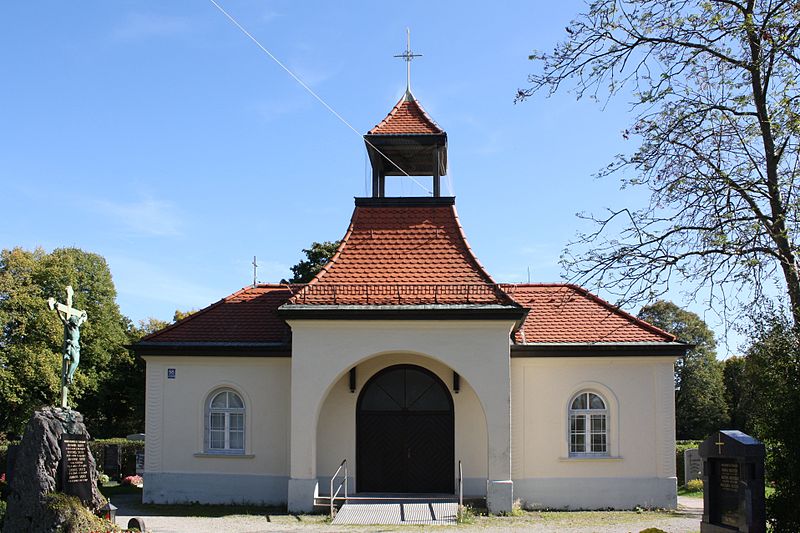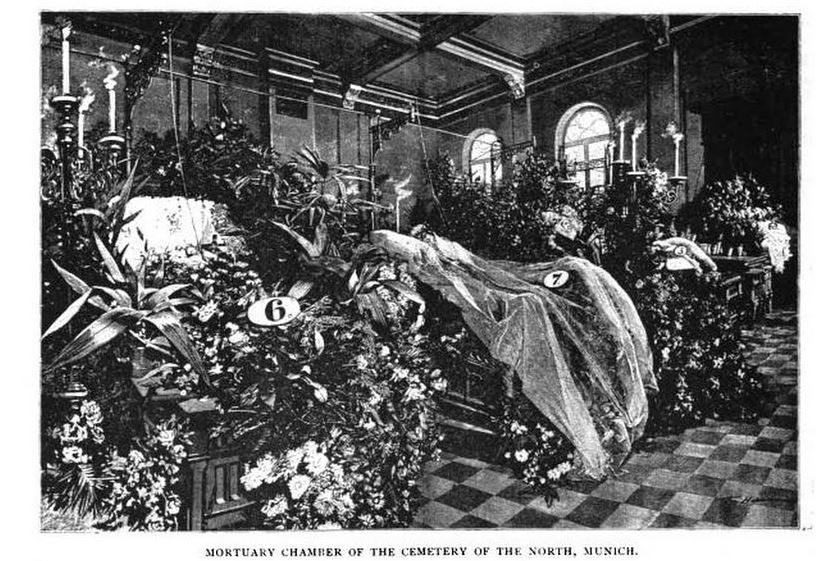
In some parts of Germany, such is the general dread of being buried alive that a system of precaution against this premature act is in vogue, by which more than one person has been restored to life and friends after being mourned for dead. The plan is, for the corpse to be placed in a comfortable apartment, with face uncovered, and with a cord or wire attached to the hands in such a manner that the slightest movement will cause the tinkling of a little bell in an adjoining apartment where some one is always on the watch till there are either signs of life or decomposition, to give the assurance of hopeless death. This custom has led to some striking scenes and curious revelations; and one of the most remarkable of these we are now about to put on record, as we received it, not long since, from the lips of the narrator:
“I had two bosom companions, and we three were nearly always together when our circumstances would permit. We were not alike in scarcely any particular, and for this reason, perhaps, we liked each other all the better. We differed on nearly every point in science, art, literature, philosophy, and religion, and argued every point we differed on.
“On one thing, however, we did agree, and that was, the possibility of being buried alive and the unutterable horror which must attend the subsequent consciousness of the fact. So, in health, we solemnly pledged ourselves, that if within reach of one another at the time of the supposed decease of either, the living should faithfully watch by the senseless form till the return of life or the certainty of death.
“My young friend, Adolph Hofer, was the first to go. He was a believer in the immortality of the soul, and the identity of the spirit with that occupying the mortal tenement. Of course we made our arrangements for watching the corpse according to our compact, but without the slightest hope of ever seeing another spark of life in that loved form.
“It was on the second night after the death of Hofer that Carl and I were sitting in an adjoining apartment conversing about the deceased and his religious belief. We had attached a small cord to the fingers of the corpse, and connected it to a little bell close to us, so that we could be warned of any movement, without being obliged to remain beside the body, which, for various reasons, would not have been agreeable to us.
“If Adolphe’s ideas in regard to the future state are correct,’ observed Carl, in the course of his remarks, ‘there is no certainty that he may now be with us, even in this room.’
“Yes,” returned I, “ if they are correct, Which I do not believe. When a man dies, he is dead, at least so far as this world is concerned.”
“That is your opinion, Jules,” said Carl; “but opinions don’t make facts.”
“It may fairly be presumed they are based on facts, when they cannot be reasonably controverted. If man exists after death as a roving spirit, give me some evidence of it, and then ask me to believe.”
“And what about ghosts?” said Carl, who was both skeptical and superstitious—and he glanced furtively and timidly around the room as he spoke, as if he expected to encounter some fearful apparition.
“Bah!” exclaimed I, contemptuously, “you know my opinion of ghosts and hobgoblins— that they have no existence except in the brains of timid fools.”
“At this moment we heard, or rather fancied we heard, a strange noise in the adjoining apartment.
“What is it?” inquired Carl, in a timid whisper.
“Nothing,” replied I, rousing myself, with a full determination to shake off what I conceived to be foolish fancy. “Are we men or children, to get frightened at the noise of a rat?”
“Hush! hark! I hear something still,” whispered Carl, now fairly trembling with fear.
“Then, if there is anything, we must know what it is!” said I, as I rose and took up the light for the purpose of going to look at the corpse. “Will you accompany me, or shall I go alone?”
“Carl Heilsten slowly and silently arose, as one who felt called upon to perform a fearful duty; but scarcely had he got on his feet, when the little bell connected with the dead was rung violently.
“My nervous system never received such a shock before or since. It seemed for the moment as if I was paralyzed. The light dropped from my hand and was extinguished, and great beads of perspiration stood all over me.
“But I remained inactive only for the time it would take one to count ten. Reasoning that my friend had come to life, and needed immediate assistance, I hastily procured another light; and merely glancing at Carl, who had fallen back upon his seat, white and helpless from his sudden fright, I rushed into the apartment of the corpse, expecting to find Andolphe living, if not actually sitting up or standing.
“To my utter astonishment, however, I found only the dead form of my friend— cold, rigid, motionless. There was such an inflexible look of death on his features, that I could not believe there was a single spark of life in the body, and a close examination of lips and heart proved there was none in reality. And yet the hands had been moved, and were drawn to one side, but rather as if jerked there by the bed-cord, which was hanging somewhat loose, than as if stirred by any internal power.
“But what had moved the hands and rung the bell? This was the startling mystery. The room was not large, and contained no great amount of furniture, and was easily searched. I had just passed the light under the bed and around and behind everything, when Carl, appeared at the door, pale, trembling, and covered with a cold, clammy perspiration.
“Is he alive?” he rather gasped than said.
“No,” I replied, “nor has there been any life in him since his breath went out.”
“Merciful God!” he ejaculatd, nervously grasping a chair for support—”what rung the bell, then.”
“That is the mystery I am trying to solve,” said I “It is possible there may be some person concealed here.”
“I cautiously opened the door of a long, deep closet as I spoke, in which hung the clothes of the deceased, and went in and examined it thoroughly. No other human being was there, and nothing had been disturbed. There was no outlet to the room except the door communicating with the apartment in which we had been watching, and two windows looking out upon a lawn, and the sashes were closed and the curtains drawn. showing no signs of recent disturbance. I then re-examined the room, and particularly the bed, but without making any new discovery.
“This is all very strange!” said I, half musingly, and looking inquiringly at Carl— “very strange indeed!”
“It must have been something supernatural!” he replied, in a hollow whisper, and moving over to the chest in the corner, he sank down upon it.
“As he did so, the sharp click of the spring lock caused him to bound up as if shot. For a moment or two he stood trembling, and then said with more nerve:
“I believe I am a cowardly fool, to be scared at everything! I do not fear anything human, though,” he added, “but this unearthly business unmans me.”
“I now re-examined the corpse, to be sure there were no sign of life in it, and found not only death there, but the beginning of decomposition. Perfectly assured of this, we went into the other apartment, and sat down, to watch through the remainder of the night and ponder the mystery. Scarcely were we seated before we fancied we heard dull, muffled sounds in the dead room, followed by something like a smothered human groan. Carl’s teeth now fairly chartered with terror, and I confess I never felt less courageous in my life. These strange noises only continued for a short time, then gradually died away into silence, after which we were disturbed no more.
“In the course of time our friend was buried, and some time after the funeral we proceeded to open his strong box or chest, according to his direction. Then it was that our supernatural mystery had a natural but horrible explanation:
“In that chest was the black and decaying corpse of one whom we had known in life !
“The following is our conjecture:
“Cognizant of Adolphe Hofer’s money and jewels, of their place of deposit, and of our mode of watching the dead, he had, on that eventful night, entered the dead-room through a window, at an early hour, and concealed himself in the closet till midnight; and then set about his work of robbery. Some accidental noise having alarmed us, as he could tell from our conversation, he had either in his haste to secrete himself, or intentionally to frighten us still more, rung the bell in the manner stated, and then got into the chest, which had a powerful spring-lock. My friend Carl, by accidentally sitting down on this, had sealed his doom; and his subsequent groans, and terrible efforts to burst from his narrow prison, were the strange noises which had so disturbed us the second time. The man’s death was a fearful retribution, and the discovery of his dead body spoiled an otherwise wonderful ghost story.
The Vincennes [IN] Weekly Western Sun 3 November 1866
Mrs Daffodil’s Aide-memoire: While deploring their corseted officers and their penchant for invading Belgium and France, Mrs Daffodil must express guarded admiration for Germany’s zeal to ensure that no mistakes—such as burial alive—occur to deplete the ranks of the Fatherland’s citizenry. The London-based Association for the Prevention of Premature Burial was equally complimentary, saying that Germany and Austria were the only countries to take the peril of premature interment seriously. In point of fact, there seem to be no records of corpses actually reviving in the so-called “Waiting Mortuaries,” or “Totenhaus,” although the gases of decomposition stirred many a false alarm, but it is the thought that counts.

For more tales of the grim and grewsome, see The Victorian Book of the Dead, available on Amazon and for Kindle.
Mrs Daffodil invites you to join her on the curiously named “Face-book,” where you will find a feast of fashion hints, fads and fancies, and historical anecdotes
You may read about a sentimental succubus, a vengeful seamstress’s ghost, Victorian mourning gone horribly wrong, and, of course, Mrs Daffodil’s efficient tidying up after a distasteful decapitation in A Spot of Bother: Four Macabre Tales.
Chris Woodyard is the author of The Victorian Book of the Dead, The Ghost Wore Black, The Headless Horror, The Face in the Window, and the 7-volume Haunted Ohio series. She is also the chronicler of the adventures of that amiable murderess Mrs Daffodil in A Spot of Bother: Four Macabre Tales. The books are available in paperback and for Kindle. Indexes and fact sheets for all of these books may be found by searching hauntedohiobooks.com. Join her on FB at Haunted Ohio by Chris Woodyard or The Victorian Book of the Dead. And visit her newest blog The Victorian Book of the Dead.